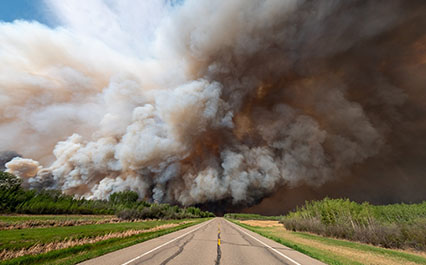Page Content

Town of High Level – Wildfires near High Level forced the town to be evacuated for nearly two weeks. Schools will remain closed for the duration of the school year due to smoke damage.
When the wildfire evacuation order was issued for Wabasca – Demarais on May 29, teacher Terri-Lynn McLeod immediately jumped into action. Like many residents, McLeod packed up her most important belongings and some clothing, but with one difference.
“My suitcase stayed open on the spare bed, ready for a few last-minute items. I would only be leaving if things got really bad,” she said.
McLeod is not only a teacher at Mistassiniy School in the Northland School Division, she is also a captain with the Wabasca Fire Department. Since the evacuation order was issued, McLeod has been putting in grueling 12 to 18 hour days.
You’re going to be OK
McLeod’s first task was to make sure all of the Wabasca’s residents were evacuated. She recalls knocking on one door in the early morning hours of May 31. A nine-year-old girl answered, saying her grandparents were asleep. After getting the child to waken her grandparents, McLeod noticed the young girl’s hands were visibly shaking.
“I took hold of her hands and told her that she would be OK,” said McLeod. “I knew that if they left, they would be OK. I couldn’t tell her that her home would be OK, because I just didn’t know that, and still don’t.”
Dylan Brushett works as an educational assistant at the Mistassiniy School in Wabasca. He recalls the air being thick and absolutely disgusting to breathe in.
“When they announced poor air quality in our area, I knew evac was just around the bend,” he said.
Brushett and his fiancée decided to volunteer at one of the evac centres in Edmonton. He says there were a lot of families from the reserve without the proper ID.
“A lot couldn’t file for their relief money yet, and you could tell the community members were in a struggle.”
High Level evacuated
“Oh, my gosh! If that town goes, it will not recover,” were the first thoughts of teacher Elizabeth Cabezas when she heard the wildfires were edging dangerously close to her home town of High Level.
Cabezas was in Edmonton attending the ATA’s Annual Representative Assembly when the evacuation order was issued.
“I didn’t even have a chance to grab any of my important belongings,” she said.
Cabezas, who teaches at the Florence McDougall Community School, was one of the 4,000 residents of High Level who were part of the May 21 evacuation.
“We had staff who left with their children but left their husbands here because they were volunteer firefighters,” said Cabezas. “I think they did an amazing job. All of them.”
|
Once High Level was evacuated and the rest of the county was put under an eight-hour notice, Fort Vermillion School Division superintendent Mike McMann decided to close all the division’s 14 schools, a move that affected 235 teachers and roughly 3,500 students.
“There’s no one in their right mind that’s going to put children in schools and then expect parents to collect them when the situation turns red,” said McMann.
Once the evacuation order for High Level was rescinded on June 3, teachers were allowed to return to their classrooms for a maximum of four hours a day to finish up report cards, IPPs and collect student materials. Smoke damage to HVAC systems made the schools unsafe for students, so the remainder of the school year was canceled. Students in the division have been exempted from all PATS and diploma exams.
|
“I’m extremely proud of the Fort Vermillion School Division employees for doing our part to help our neighbours and to get through this.”
—Mike McMann, Fort Vermillion, School Division superintendent
|
“I’m extremely proud of the Fort Vermillion School Division employees for doing our part to help our neighbours and to get through this,” McMann said. “Leaning into hard stuff is what FVSD does well.”
As of press time, seven schools in the Northland School Division remain closed.
Communication is key
The ATA has received a few calls from teachers wondering what they should or shouldn’t do when returning to work.
“Our advice is to basically follow the directions of the board,” said Robert Mazzotta, co-ordinator for ATA Member Services. “Don't go to the schools unless you’re supposed to.”
Mazzotta said Member Services is there to assist teachers with any concerns about the options available to them.
“For all questions about employment matters, they should call Member Services directly. If they have a question about sick leave or they want to leave early or whatever, they should call Teacher Welfare and access whatever provisions exist in their collective agreement,” he said. ❚
